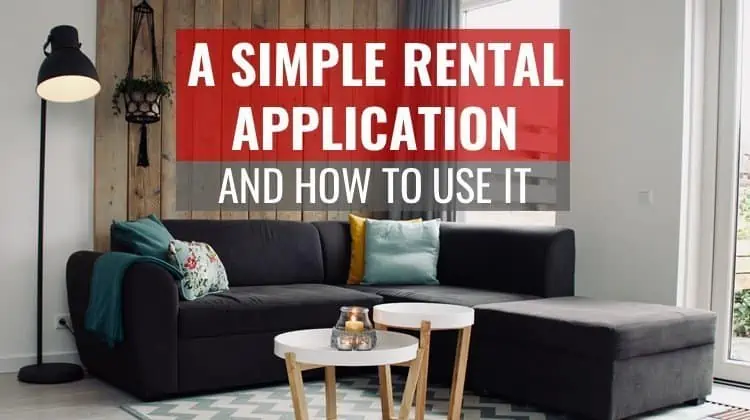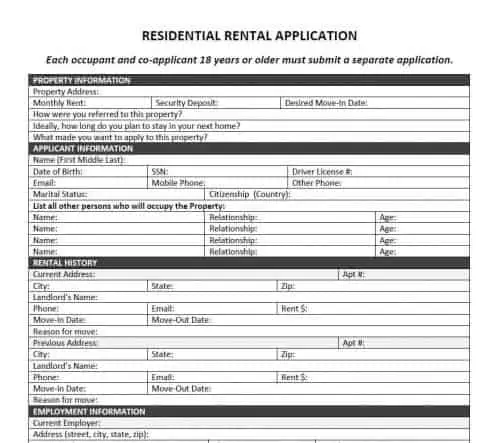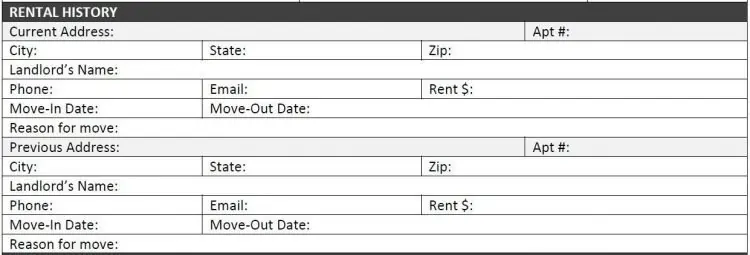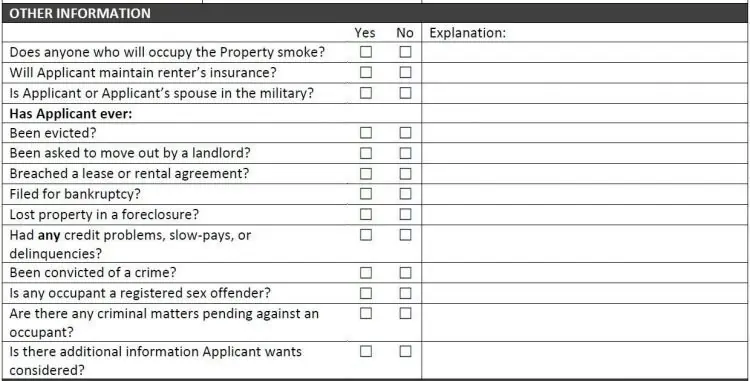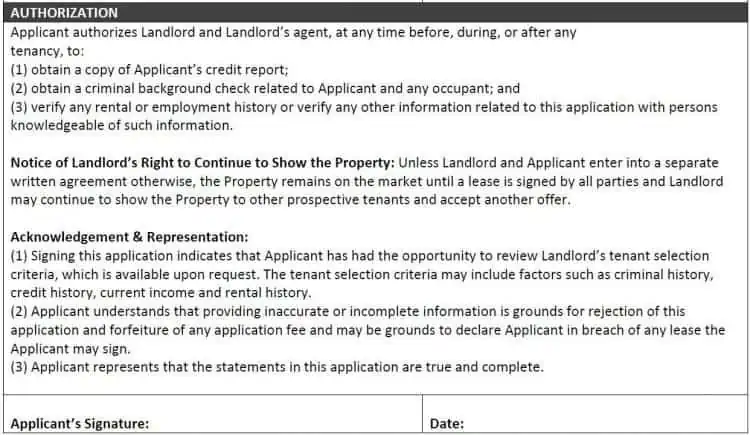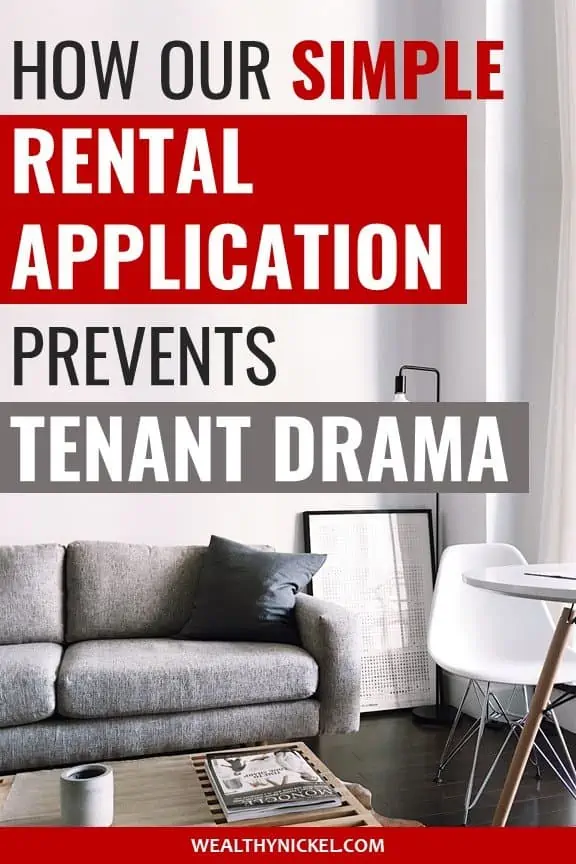Are you looking for a rental application form that is simple, but also covers all the information which you need to select the right tenant for your property?
Then you are in the right place!
I think this is the absolute best rental application template out there (although it’s mine so I might be a little biased).
Keep reading to see how we use our application form and how to get a free printable version!
What Makes a Good Rental Application Form?
When we bought our first rental property, I scoured the internet for the best free rental application I could find. Unlike a lease agreement, most rental applications aren’t state specific so they generally collect the same set of basic information. I wanted a simple rental application form, but not TOO simple.
I have found that some rental applications are better than others, and over the years I’ve modified mine to ask certain questions to try to narrow down my ideal tenant. The problem with many of the online forms I’ve found is they are either too detailed (I don’t need 5 pages of back story, thanks), or too simple (umm, can I at least get your current address?)
The rental application serves one main purpose: to help you collect all the information you need to make an informed decision on whether or not a particular applicant fits your screening criteria.
Anything else is just fluff, and if your application form is too short you won’t get enough information to make a good decision.
Our Simple Rental Application Form
I think most landlords can agree that they are looking for a stable tenant that has enough income to cover the rent, plans to stay awhile, and will take good care of your property. The hard part is figuring out who that is from a brief conversation at an open house.
A good, simple rental application form will go a long way in helping you screen out tenants that aren’t a good fit.
Let’s go through the sections one by one and see why I think you need all of this information to be able to effectively screen tenants.
Property Information
This is the information about the property you are renting. You could pre-fill the property address, monthly rent, and security deposit if you want, or let the prospective applicant do it and see if they can get it right from the listing (i.e. do they pay attention to detail?)
I always ask for a desired move-in date because I constantly get inquiries from applicants who aren’t looking to move for another 3 months or more. I just got finished signing a lease for one of our properties where I was looking for a May 1st move-in date, but one of the potential applicants said they weren’t looking to move until July. Uh, kudos to you for planning ahead, but I can’t leave my house empty for 3 months waiting for you to move into it!
The next 3 questions are free form and I think possibly the most important questions on the entire rental application. They are free form for a reason – I want to see what the applicant says without prompting.
- How were you referred to this property? Ok, not the most important question. But I’d like to know which of my marketing efforts succeeded in drawing in applicants.
- Ideally, how long do you plan to stay in your next home? This is key. I am looking for someone who wants to stay awhile, and will not jump to another property in a year. Turnover and vacancy costs are some of the quickest cash flow killers for a rental home.
- What made you want to apply to this property? I’m not just looking for affirmation on why my property is the best (ok maybe a little). The answer to the question could be gold – maybe they like the schools (an indication they will want to stick around awhile), or their family lives next door (again hopefully they’ll want to stay longer and take good care of the property).
Applicant Information
This is all the personal information you’ll need to get in contact with the applicant and run proper credit and background checks.
- Full name
- Date of birth
- Social security number
- Driver’s license number
- Contact information
You also want to know a list of everyone who will be occupying the property (kids, spouses, relatives, etc.) This is also a good double-check because even though it says in big bold letters at the top that anyone over the age of 18 needs to submit their own application, sometimes this doesn’t happen. For you, the landlord, it is important to run a background and credit check on every adult living in your property, which is why you want a separate application for each individual.
Rental History
There is a lot of good information to be gained from this section of the simple rental application. You can tell a lot about someone based on their rental history. Here are the main things I’m looking for:
- Contact information for current and previous landlord. Most landlords are too lazy to call references, but not me (and not you if you’re smart). I want to talk to the prior landlords to see if they paid their rent on time, if they were easy to deal with, if there were any complaints against them, etc. Sometimes you’ll talk to an apartment office and they’ll just give you some standard info (which is still good), but sometimes you’ll talk to a chatty landlord who can give you some great insight into your prospective tenants.
- How much they paid in rent. If they are currently paying $800 per month, but want to rent your property at $1,500 per month, I would definitely have some follow up questions. I want to make sure rent is in line with what they paid in the past, or they have a good reason for the increase (or decrease).
- How long they stayed and why the moved out. If they were in their last 2 residences for a year or less, chances are they’ll be leaving you in a year as well. I also want to see a legitimate reason for moving, such as for a job or to find better schools for their kids. If they list petty reasons like they didn’t like the landscaping or the hot water was too hot, that could be a red flag for a high maintenance tenant.
Employment Information
This is another good part of the application form to judge the stability of your potential tenant. Obviously you want to know their income and that it meets your criteria (general rule of thumb is it should be at least 3X the rent, but this will be based on your tenant screening criteria). But you also want to know how long they’ve been in their current position and whether they are on an upward or downward career trajectory. Chances are if they hop jobs as often as they change residences, they are not going to be an ideal tenant.
In this section of the simple rental application, just like in the last section, I want to gather contact info for their current and previous employer. I will do the unheard of and actually call their supervisor! Do they show up to work on time? Are they responsible? Any behavior or character issues the supervisor is concerned about? If the applicant moves into your property, you will be in a long term relationship with them – make sure you have as much information on them as you can get!
The last question on the employment information asks for any other income the applicant wants considered. This could be alimony payments, a trust fund (wouldn’t that be nice), or anything else that provides stable income. Your tenant screening criteria is up to you, but I highly recommend getting proof of income – whether paystubs, tax statements if self-employed, or bank statements to prove child support is actually being paid.
Emergency Contact
You’ll need an emergency contact when/if you eventually sign a lease. If something goes terribly wrong and you can’t reach the tenant, who should you call?
Vehicle Information
This section of the rental application form serves a few purposes. First, I want to make sure there is enough parking. If there are 2 parking spaces and 5 cars that’s probably not going to work. I also want to see what kind of car payments they are carrying every month in relation to their income. If they make $3000 per month and are leasing a BMW at $500 per month, there’s probably a good chance they are living paycheck-to-paycheck and you might not get your rent payments on time…
Pet Information
My lease agreement specifically forbids pets unless there is a pet addendum. If they have pets, I want to know what kind and how many. In some cases, your insurance will dictate what kind of pets you can accept (e.g. sometimes “aggressive” breeds are disallowed in your insurance policy).
I used to collect a pet deposit, but that turns into a paperwork headache and you then have to document what damage was caused by pets vs. normal wear and tear. I have since gone to just a straight pet fee of $25 per pet. I can almost guarantee you will have more wear and tear on your rental from pets, so you might as well get compensated for it. I’ve found this actually goes over better with tenants because they don’t have to come up with a large deposit up front, but your mileage may vary.
Other Information
This is a list of questions that goes over some of the more critical things that I care about in my tenant screening.
I always tell applicants up front that I WILL run a background and credit check and I WILL call their references, so if I’m going to find anything negative on them I’d rather hear it from them up front than later on when I’m doing my research. Most applicants are honest and up front if they’ve had credit trouble and why, or if they have a misdemeanor that will come up on a background check. A lot of these things are not deal breakers for me, but if they hide it from me up front you can bet their application gets denied if I find out about it later.
For some of these questions, answering “yes” is an automatic disqualification (e.g. if they have an eviction on their record or are a registered sex offender).
I also require all my tenants to maintain renter’s insurance. It’s cheap (like $10-15 per month) and protects their personal property should something crazy happen like a fire or flood.
Authorization
This is a little bit of legalese, but you want to make sure the applicant knows they are giving you permission to run a credit check and background check, and to obtain rental and employment history. Depending on the prior landlord or employer, they may require you show them that the applicant gave you permission to access this information.
I also want the applicant to acknowledge that they understand our tenant selection criteria and understand that we will be verifying all of the information given.
Documentation to Submit with Rental Application
In addition to the simple rental application form, in order to do you due diligence in your tenant screening process, I always collect a few more things from the applicant.
- Copy of driver’s license. This will verify their name and driver’s license number which is used as a crosscheck in the background check.
- Two most recent paystubs. This is to validate their income matches what they say on the application. If they are self-employed, I usually want to see the last 2 years of tax returns.
Tenant Screening Process
While this is really an article unto itself, once we have validated everything we can without calling employers or past landlords, we will move on to the background and credit check.
Credit and Background Check
We have used and recommend Transunion Smartmove for the credit and background check. It is the most comprehensive one we have found. It provides the credit report, criminal record check, and eviction record check. It is all online, and all you need is the applicant’s email address. They actually pay for the credit and background check themselves online, which means I don’t have to collect and keep up with an application fee!
There are a few similar online tools out there. In our most recent search for a tenant, we tested out Zillow’s built-in application and tenant screening process. While it was seamless and easy to use, it just wasn’t that useful. Zillow’s default application (which you can’t change) doesn’t have nearly enough of the information we need to make a good decision.
And we found that the background check does not search eviction records (even though it says it does). Maybe it works in some parts of the country, but not where we live in Texas. That is a deal breaker for me, as having an eviction is one of the number one things we care about. So at least for now, I can’t recommend Zillow as a one-stop shop for finding new tenants.
Call References
Moving on, if the credit and background check come back clean, we will then reach out to any and all references (employers, past landlords) on the application.
I cannot stress enough that this is the most important step of the whole process, and the one that will set you apart from the average landlord. We have had many tenants move on for various reasons, and I think I have only gotten 2 calls in my life from their next landlord asking me about their time at my property.
If all their references check out as well, then we extend an offer to sign a lease!
The Simple (But Not Too Simple) Rental Application
The rental application is one of the most important documents you have to collect the RIGHT information about your prospective tenants.
There are plenty of simple rental applications out there, but many of them err on the side of too simple and don’t ask for enough data to really do your due diligence.
One bad tenant can cost years of cash flow (ask me how I know). I want to save you from some of the mistakes we made, and a big step is to have an application that is simple to fill out and understand, but has all the information you need to make a good decision.
In the end, even the best rental application template won’t save you from every bad tenant, but it can go a long way toward screening out 99% of them if you’re willing to put in the work to validate and verify everything on there (as the saying goes, trust but verify).
Andrew Herrig is a finance expert and money nerd and the founder of Wealthy Nickel, where he writes about personal finance, side hustles, and entrepreneurship. As an avid real estate investor and owner of multiple businesses, he has a passion for helping others build wealth and shares his own family’s journey on his blog.
Andrew holds a Masters of Science in Economics from the University of Texas at Dallas and a Bachelors of Science in Electrical Engineering from Texas A&M University. He has worked as a financial analyst and accountant in many aspects of the financial world.
Andrew’s expert financial advice has been featured on CNBC, Entrepreneur, Fox News, GOBankingRates, MSN, and more.
